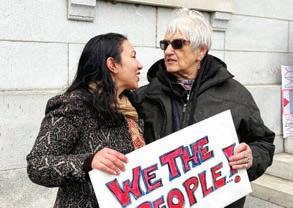Page 4

Orchard Elementary School students win big at Odyssey contest
Page 8


Page 4

Orchard Elementary School students win big at Odyssey contest
Page 8

LIBERTY DARR & BRIANA BRADY STAFF WRITERS
On a particularly balmy spring day last week, a woman was meandering around the Charlotte library when Margaret Woodruff, the library director and friendly face around the building most days, approached her to ask if she needed any help. The woman explained that she had just gotten into town to scout a property she’s looking to buy.
It seemed fitting that Woodruff was one of the first people to greet her in her new town, and that one of the first places she visited was the local library.
News for librarians across the country has been far less bright in recent weeks. Woodruff and several other library directors across Chittenden County have been grappling with President Donald Trump’s recent executive order seeking to eliminate “to the maximum extent” the Institute of Museum and Library Services, the primary source of federal support for the nation’s museums and libraries.
Last week, the institute placed

its entire 70-person staff on administrative leave.
“We have never had to think about having to defend ourselves as an institution before,” Woodruff said. “We’ve never considered libraries to be the ‘bad guy.’ It’s really so unprecedented.”
In Vermont, the institute provides roughly one-third of the state’s Department of Libraries’ funding, which in 2024, amounted to roughly $1.2 million, said Commissioner and State Librarian Catherine Delneo.
Those federal funds support a slew of shared services within the state, from the interlibrary loan program — the service that moves books and other materials across the state’s libraries and libraries across the nation — to the ABLE library service for the blind and visually impaired, online databases, as well as other resources and professional development for library workers.
Delneo said the state department has been using the Institute of Museum and Library Services
See LIBRARIANS on page 10

LIBERTY DARR STAFF WRITER
“Howdy do!” Roger Abare said, his voice full of life. 100 years of life.
The South Burlington resident sat comfortably last week in his leather-bound rocking chair in the
same house he has lived in since 1956. He has seen the city shift and change from that very spot, watching cars — and the decades — pass from his living room window just off Hinesburg Road.
The road is now much different than it looked in the 1950s, as cars zip and zoom through landscape
that has grown to be much more of an urban atmosphere. Debbie Ruppel, Abare’s daughter, remembers when the area that encompassed Hinesburg Road was nothing but a massive field where she
See ABARE on page 12




Palm/Passion Sunday Service with Palms
April 13 • 9:30 a.m.
Maundy Thursday Service with Communion
April 17 • 6:30 p.m.
Good Friday Open Prayer Space
April 18 • Stop by 3:00-6:00 p.m.
Easter Sunday Worship
April 20 • 9:30 a.m.

Optional Conversations with Pastor

All Are Welcome

899 Dorset Street, South Burlington 802-863-6764 • faithsbvt.org





Easter is April 20
ETHAN WEINSTEIN VTDIGGER
Following a federal directive that schools ban “illegal” diversity, equity and inclusion-related programs, the Vermont Agency of Education last Friday asked school districts to submit compliance certifications.
But just three days later, after initially defending and clarifying the decision in the face of public backlash, Education Secretary Zoie Saunders backtracked late Monday afternoon, informing superintendents the state would instead send a single statewide certification.
“To be clear, the Agency of Education and the Attorney General’s Office continue to support diversity, equity, and inclusion practices in our schools. Our communication on Friday was intended to make you aware of the directive from the
U.S. Department of Education regarding Title VI,” Saunders wrote Monday afternoon, “and to reinforce that diversity, equity, and inclusion practices are lawful and supported in Vermont. In no way, did AOE direct schools to ban DEI.”
So why all the confusion?
On Friday, Saunders told school district leaders they had 10 days to submit their certification, but also said the agency believed certification required only that districts “reaffirm … compliance with existing law.”
That communication came in response to President Donald Trump and his administration, who have threatened to withhold funding to public schools that fail to comply with the expansive directive.
A letter dated April 3 from the U.S. Department of Education said noncompliance with the diversity programming ban
could result in schools losing a crucial stream of money meant to support economically disadvantaged students, known as Title I, among other sources of federal dollars.
The letter cited Title VI of the Civil Rights Act of 1964, which prohibits discrimination in schools based on “race, color or national origin,” and cited a 2023 U.S. Supreme Court Case against Harvard University and the University of North Carolina that restricted affirmative action. Saunders, in the letter to district leaders, wrote that the federal restriction includes “policies or programs under any name that treat students differently based on race, engage in racial stereotyping, or create hostile environments for students of particular races.”
Programs highlighting specific cultures or heritages “would not in and of themselves” violate federal regulations, the letter said. “We do not view this Certification to be announcing any new interpretation of Title VI,” Saunders wrote, adding that the agency’s “initial legal review” determined the federal letter only required the state to “reaffirm our compliance with existing law.”
But guidance from the federal education department cited by Saunders seems to restrict a variety of practices, arguing that school districts have “veil(ed) discriminatory policies” under initiatives like diversity programming, “social-emotional learning” and “culturally responsive” teaching.
Following news of the agency’s letter to districts, Saunders released an initial public statement around 3 p.m. on Monday saying the federal demands would not require Vermont’s schools to change practices. And in that communication, Vermont’s top education official gave no indication the agency would alter its request for districts to confirm their compliance with Trump’s directive.
“The political rhetoric around this federal directive is designed to create outrage in our communities, confusion in our schools, and self-censorship in our policy making. But we are not going to allow the chaos to control how we feel, or how we respond,” Saunders said in the statement. “Our priority is to protect Vermont’s values, preserve essential federal funding, and support schools in creating positive school environments free from the type of bullying and manipulation we see in our national politics today.”
In the same press release, Vermont Attorney General Charity Clark said Vermont was in compliance with federal law.
“We will continue to protect Vermonters against any unlawful actions by the federal government,” Clark said.
One neighboring state, meanwhile, took a different tack. Soon after the Trump administration sent states last week’s letter, New York announced it would not comply.
Vermont and other states’ responses to the federal government are due April 14, and the state agency said last week that its response was supposed to include school districts’ “compliance issues” and “the Agency’s proposed enforcement plans” for those districts.
Before Saunders, in consultation with Clark, decided to rescind the state’s request for districts’ certifications, the Agency of Education’s actions
drew criticism from the public education community.
Representatives from the Vermont School Boards Association, Vermont Principals’ Association, Vermont Superintendents Association and Vermont-NEA, the state teachers’ union, met with state leaders Monday. They later penned a letter to Saunders and Clark calling Vermont’s approach to the federal directive “not workable.”
“Expecting individual superintendents to certify compliance based on a cover letter (that they have not yet seen) that clarifies the legal boundaries of their certification will lead to a patchwork of responses that could put Vermont and local school districts at risk,” the organizations wrote.
The coalition urged Vermont to follow New York’s lead and reject the certification process. That strong approach, they wrote, “would also send a powerful message to students and families across the state.”
Hours later, the Agency of Education appeared to heed their advice. In her late afternoon message to superintendents, Saunders wrote that “AOE has received feedback throughout the day regarding the need for clarity on the intent of the certification and the state’s specific response.”
“We understand that many in the community are concerned because of the political rhetoric surrounding DEI,” she added.
News of Saunders’ initial Friday letter spread quickly on social media over the weekend.
Already, plans for a Wednesday protest had circulated online.
At least one district, Winooski, said it wouldn’t comply with the certification.
“I notified the Secretary that I will not be signing anything,” Wilmer Chavarria, the district’s superintendent, wrote in an email to staff shared with VTDigger. “I also requested that the state grow some courage and stop complying so quickly and without hesitation to the politically driven threats of the executive.”
Winooski’s school board will address the compliance certification at a regularly scheduled board meeting Wednesday, according to Chavarria’s message.
In Vermont, ethnic studies have been a larger part of the education landscape since the passage of Act 1 in 2019. The law, which the Legislature approved unanimously and Gov. Phil Scott signed, required public schools to incorporate ethnic studies into their curricula. The legislation charged a panel with making suggestions for better including the history and contributions of underrepresented groups in Vermont’s classrooms.
Enjoy a heartwarming Easter brunch with live music, great food, and cherished moments with family and friends in our beautiful atrium.

SUNDAY, APRIL 20
TWO SEATINGS ( 10:30-11:00 AM & 1:30-2:00 PM )
ADULTS $65 | AGES 5-12 $28 | UNDER 5 FREE Prices do not include taxes and gratuity.

• Made-To-Order Omelets with Fresh Ingredients
• Carving Stations Featuring Leg of Lamb and Prime Rib
• Build-Your-Own Waffle Bar Served with Pure Vermont Maple Syrup
• Freshly Baked Pastries and Seasonal Desserts
RESERVE





Chittenden Southeast Sen Kesha Ram Hinsdale was one of the featured speakers at Saturday’s “Hands Off” rally in Montpelier. Here is her full speech.

I am Senate Majority Leader Kesha Ram Hinsdale and I’m so proud to be standing here with all of you — neighbors, organizers, advocates, everyday Vermonters — who are showing up with courage, conviction, and heart. I’m especially proud to be here with my daughter Mira, who is able to look out and see those who will watch over her, will pave the way for her, and will protect her rights more than I hope she will ever know.
She’s also going to be two
next week, and she’s working on doing something that she could teach to Donald Trump and his cronies: Keeping your hands to yourself.
So, we are here today, across Vermont and across the nation, with one message, loud and clear: Hands off.
Hands off our mouths. We will not be silenced. We will not be scared into the darkness. We will protest injustice, we will speak truth to power, we will tell our stories, and we will continue to demand our country back.
Because let’s be clear: it has never been more consequential to exercise our freedom of speech than it is right now. Across this country, voices are being silenced, books are being banned, and neighbors are being pitted against each other in unfounded suspicion and fear.
This is a moment to really feel the weight of the Zora Neale Hurston quote, “If you are silent about your pain, they will kill you and say you enjoyed it.”
So, when we say “hands off our mouths,” we are saying: Let people name their oppression. Let
South Burlington’s Community Newspaper Since 1977 A publication of Vermont Community Newspaper Group LLC otherpapersbvt.com
Advertising Director Judy Kearns judy@otherpapersbvt.com (802) 734-2928
Advertising Wendy Ewing wendy@shelburnenews.com (802) 238-4980
Editor Tommy Gardner tommy@stowereporter.com (802) 253-2101 x25
Staff Writers
Aaron Calvin Liberty Darr
Patrick Bilow Briana Brady
Production/Design
Stephanie Manning stephanie@shelburnenews.com Kristen Braley kristen@stowereporter.com
General Manager Katerina Werth katerina@stowereporter.com
Billing inquiries Leslie Lafountain leslie@stowereporter.com (802) 253-2101
Advertising submission deadline: Friday at 5 p.m. advertising@otherpapersbvt.com classifieds@otherpapersbvt.com
Editorial submission deadline: Friday at 12 p.m. news@otherpapersbvt.com
Calendar submission deadline: Friday at 12 p.m. news@otherpapersbvt.com
Contact: PO Box 489 Stowe, VT 05672 (802) 253-2101
people share their lived experiences. Let people call out injustice — because staying silent will not protect us.
And for those of us with privilege — those who can speak without risking our safety, our jobs, or our lives — it is our responsibility to do it loudly, boldly and without apology. We must use our voices not just as shields, but as megaphones for those who are being silenced.
Hands off our rights. We will not accept attacks on immigrants, on students, on young women like Rumeysa Ozturk, who was abducted in broad daylight in Boston and is now due her day in court and her constitutional rights here in Vermont.
We will not accept attacks on our trans neighbors, and you should know that, despite our differences, we voted 30-0 to stand with trans and nonbinary Vermonters in the state Senate. We will not accept the rollback of abortion rights, voting rights, or any rights that let us live freely and fully.
Hands off our state. Vermont knows how to lead. We’ve led the way on civil rights. On environmental justice. On reproductive freedom. On free speech. We will not let federal overreach drag us
backward. Not now. Not ever. And hands off our democracy. We see what’s happening. And we won’t stand by while the rule of law is twisted, institutions are undermined, and our communities are divided. This isn’t about partisanship — it’s about principles.
We live by a motto in this state: Freedom and Unity. And that means we fight for each other’s freedom. We come together in unity when one of us is attacked. And we do not let anyone tell us who we are or what we stand for.
But while we are here together in this beautiful sea of humanity, I want to add something else. While we demand hands off our rights and our dignity, we must also be hands on with our communities.
Hands on our neighbors. Hands on the hard work of care. Hands on the shoulders of people who need support.
Check in on each other. Ask who’s struggling. Bring someone food. Speak up in rooms where others are silenced.
And to the protesters holding signs every day, rain or shine, in front of the Tesla dealership on Shelburne Road: thank you. You lift my spirits up and bring my blood pressure down every

day when I drive home from the Statehouse. You are not screaming into the void or preaching to the choir — you are reminding us that we have the power when we stand together and do not back down.
And that reminds me of an image I’ll leave you with. Sequoia trees, the tallest trees in the world, don’t survive because they stand alone. They survive wildfires, storms and centuries of change because their roots reach out and intertwine beneath the surface — holding each other up, locking arms underground, refusing to fall.
That’s what we do here in Vermont. We reach out. We hold one another up. And we stand tall, together, because, as vice president Kamala Harris reminds us, “Courage is contagious.”
So, let’s keep showing up — for each other, for our communities, and for our future. Hands off our rights. Hands on our communities. Freedom and Unity — now and always.
Kesha Ram Hinsdale, a Democrat from Shelburne, serves the towns of South Burlington, Shelburne, Charlotte, Hinesburg, Burlington, St. George, Underhill, Jericho, Richmond, Williston and Bolton in the Legislature.

From the House Rep. Kate Nugent
In early January, the House Committee on Government Operations and Military Affairs introduced and passed H.1 to protect the separation of powers.

Rep. Kate Nugent
The rationale behind this is that each branch of government was conceptualized to be endowed with separate and equal powers, similar to the way our Bill of Rights recognizes that every human is endowed with inalienable rights. These rights are not given or granted by any entity but are born with the person. Similarly, the branches of government are not given their powers by the Constitution, but the Constitution recognizes their powers.
In other words, powers that each branch have are absolute, separate and equal. The weight of each branch balances with the other two, which ensures that power is distributed and diffused. Having three means that there cannot be two potentially locked in perpetual opposition.
This is why even if one branch attempts to take power away from another, its actions may not be binding, because it did not have the authority to take that power.
The ethics law, Act 171, when passed last year, was a large law with many components and was a strong step in building in more clarity between citizen and government. The act makes sure government entities in Vermont have the resources they need to be transparent and ethical in decision-making.
However, as in life, it was not perfect. H.1, therefore, addresses an issue created in Act 171 that subverts the separation of powers. This process is set to take effect in July and would require the Legislature to delegate its ethics panel’s authority to the Ethics Commission. The Legislature’s constitutional authority includes the authority to review qualifications of its own members; the
judicial and the executive branches both also have this authority.
This matters because the Ethics Commission is an entity that executes and, in some cases, enforces laws made by the legislative branch, and so is part of the executive branch of government.
In Federalist Paper No. 47, James Madison stated, “[W]here the whole power of one department is exercised by the same hands which possess the whole power of another department, the fundamental principles of a free constitution are subverted.”
Judging the qualifications of its members is one of the central authorities and duties of each branch and multiple court cases have affirmed this in Vermont and in other states.
The Vermont constitution separates the powers of its branches of government among 180 legislators, a judiciary and an executive. These branches are representative of individual residents and citizens who are organized into municipal governments. Inside municipalities are groups of citizens and residents that regularly convene in committees to discuss issues and potential changes to policies and laws.
By convening as a group — assembling, as it were — individuals take decision-making into their own hands. By institutionalizing regular communication among and between other committees, legislative, judicial and executive bodies, decisions made are the result of hundreds and thousands of perspectives, skills and experiences.
passions and brings those to light. We also need to ensure that we are living by our values within these institutions and processes seeing the whole human in front of us.
Throughout history, ours and others’, the installation of democratic processes led to democratic governments. The Republic of Ireland gained its independence not by declaring war on England, but by seating an independent parliament. Armed conflict followed, but it was the establishment and adherence to shared decision-making that initiated their freedom to self-rule.
Similarly, the founders of the United States did not rebel against English law, but against the uneven application of English law. They were adamant that there should be no taxation without representation. When Samuel Adams created committees across the colonies as a way to convene leaders and discuss and influence laws, the English government tried to squash them.
H.1 may seem small in the context of changes being made at the federal level, just as assembling to discuss how best to spend bike path funding may seem relatively small. However, I believe they are not small at all.
The founders of the United States did not rebel against English law, but against the uneven application of English law.
This means that, in a democratic system, power resides with each person and each person is accountable to every other person. Diffuse power is the way we ensure that individual passions and biases — which we all have and are prone to — are less likely to dominate the laws that ultimately get made.
When policies and laws are looked at by multiple, successive groups of individuals, the merits of them can become clearer because each person sees the impact on their interests and
The Englishcrown sympathizing Gov. Thomas Hutchinson of Massachusetts in 1772 was continually flummoxed by the gathering of citizen committees. Adams, the governor at the time said, “‘The inferior people’ met constantly,” and ‘All America would fall in line if London tamed the irascible Massachusetts House, silenced the town meetings, and investigated treason among the ‘pretenders to patriotism.”
Maintaining the integrity of the separation of powers and the successive government and citizen-led decision-making groups is, in my opinion, the most powerful and effective way to incentivize ethical behavior.
Kate Nugent, a Democrat, represents South Burlington in the Chittenden-10 House district.






April 12-13, Palm Sunday WeekendSaturday, 4:30 p.m. • Sunday, 9 a.m. and 11 a.m.
April 17, Holy Thursday, 7 p.m.
April 18, Good Friday, 7 p.m.
April 19, Easter Vigil, 8 p.m.
April 20, Easter Sunday, 9 a.m. and 11 a.m.




















Governor Scott is doing what he promised to do
To the Editor:
Governor Scott’s recent veto of the Budget Adjustment Act signals the end of one-sided, policy-driven bills forced through the Vermont Legislature. With Vermont voters deciding last November to eliminate the Democrat/Progressive supermajority in the General Assembly, we restored the mechanism of checks and balances that ensures bills are honestly and openly discussed and evaluated for the best interest of Vermont. Gone are the days when the supermajority-led Legislature could simply override and ignore a governor who received more than 71 percent of the popular vote — more than 266,000 votes.
Gov. Scott is now doing exactly what he said he would do during the 2024 campaign: make Vermont affordable. The majority party legislators had forgotten how to cooperate and negotiate with the state executive branch and across the aisle to find common ground and the best solutions for Vermont. Overriding executive vetoes used to be easy, and no discussion or compromise was necessary.
When the Legislature had a supermajority, it didn’t have to acknowledge the governor’s or the minority party’s ideas and thoughts — or, for that matter, those of the voters — in the lawmaking process. That is not the case today.
The balance in Montpelier has decidedly shifted to a position where compromise and cooper-
ation are now necessary to affect solid legislation — an unfamiliar position for the General Assembly majority, which no longer has veto override assurance.
I commend Gov. Scott and his efforts to make Vermont affordable through financial common sense and accountability to taxpayers — an approach that continues to be foreign to many Vermont legislators. Thank you, Gov. Scott, for your continued commitment to Vermonters.
Bruce Roy Williston
Tesla demonstrations show solidarity in scary world
To the Editor:
Usually a great fan of the Other Paper, I was very disappointed by recent coverage of the Shelburne Road Tesla demonstrations (“Protesters hold anti-Musk rally,” March 27, 2025.)
The following line rankled: “If you were driving a Tesla down Shelburne Road in South Burlington last Friday, you might have wished you weren’t.”
Is that supposed to be funny? Clever? Really? There was no booing of Teslas, no hooting, no hateful comments yelled out, no egg throwing or anything of the sort. Those gathered there were peaceful and positive, often fueled by the energy of the enthusiastic honking of those cars passing in solidarity.
The “F-Elon” sign that was singled out was in the vast minority, as the photo with the article attests.
The rallies were, are, and have been a show of solidarity and community in an increasingly scary world, and they serve to show the world that we are not all involved in or sanctioning the insanity presently going on in the White House.
Words are powerful. Thank you for this opportunity to speak out.
Rhonda Freed South Burlington
Some Republican judges have ruled against Trump
To the Editor:
In the March 27 issue, Frank Mazur attacks “judicial tyranny.” His letter is wrong in every possible way.
In 1804, the Supreme Court decided that the final word on the meaning of the Constitution and federal law belongs to the courts. Presidential powers are what the Supreme Court, interpreting the Constitution, says they are. This is a necessary component of the “checks and balances” built into our system of government, whereby each branch of government works to prevent each of the other two branches from accumulating excessive power.
Mr. Mazur identifies three “Obama judges” and one “Biden judge” whose opinions he dislikes. He assumes that federal judges decide politically sensitive cases based on partisan agendas. To be fair, there can be no doubt
See LETTERS on page 8









































Last fall, 13 students from third and fourth grades at Orchard Elementary School established the school’s Vermont Odyssey of the Mind club with support from the school’s parent teacher organization and five parents. The club’s two teams achieved significant success at the Vermont Odyssey of the Mind state tournament, held
March 22 at Champlain Valley Union High School.
The classics cooking team was awarded the Ranatra Fusca Creativity Award, which recognizes exceptional creativity across all divisions and exemplifies the essence of the Odyssey of the Mind program. This team also placed second in Division 1 for its problem. Students on this team Aaron Addessi, Liam Bissonnette, Maeve Chin, Lilah Christman,
Finn Gilbertson, Anika Gupta and Jasper Kandell.
The Vehicle Race team secured first place in its problem. Students on this team are Chase ClarkGreen, Elizabeth Gilman, Andrew Jiang, Niyati Jindal, Freddie McRai and Theodore Mcrai.
The students were coached by Ankush Jindal, Jason Chin, Jacqueline Drouin and Rebecca Wilcke, with coordinator Deepak Gupta.
continued from page 7
that judges bring some level of ideology to their job — being human, how could it be otherwise?


utive orders, substantially often they have denied it.

Judge Bredar overturned the mass firings of federal probationary employees because the firings lacked credible performance-related reasons, advance written notice and other required procedural protections.







But, according to research by constitutional law scholar Stephen Vladeck regarding legal challenges to Trump’s executive orders, only judges appointed by Trump in his first term are demonstrably marching as a group in lockstep with a political agenda. These “Trump judges” side with the man who appointed them.




Judges appointed by other Republican presidents have decided against Trump in significant numbers. Likewise, although judges appointed by Democrats have strongly tended to grant injunctive relief against the exec-
Contrary to Mr. Mazur: Judge Boasberg did not “assume foreign policy jurisdiction” or order the return here of “vicious criminals” summarily deported to El Salvador. So far, no substantial evidence has been presented that any of the 300 deportees committed a crime in the U.S. There’s a right to due process of law, except perhaps in wartime. Are we at war with Venezuela?
Judge Chuang ordered USAID to be reopened because Elon Musk had no authority to trash the agency, and only Congress — not Trump — can close down an agency created by Congress.
Judge Reyes, who overturned the order excluding transgender people from military service, was not disqualified due to her association before becoming a judge with the Center for Gender and Refugee Studies. Judges can’t recuse themselves from every case involving a demographic group they once represented or belong to.
Steinzor South Burlington






















funds to provide grants of about $680 annually to help offset local courier costs for the interlibrary loan service for 116 public libraries across the state. Without the federal funds for the program, Delneo said the system could still exist, but the burden to fund the system would shift more to local libraries and taxpayers.
“In South Burlington and in Shelburne there is a lot of support for libraries in the local budget,” Delneo said. “But these resources are important locally because they make up a piece of the total offerings and then in some communities, they’re the full offering, so it could be even more impactful to them there if we had to pare down or eliminate anything.”
Delneo said the Department of Libraries, as of Friday, had not heard anything about its grant being cancelled, but the uncertainty is a battle in and of itself.
The Carpenter-Carse Library in Hinesburg is one of those smaller, more rural libraries that relies on that state support for the interlibrary loan courier service and the ABLE library. According to library director Jill Anderson, Carpenter-Carse, like many Vermont libraries, serves an aging population.
“We have people who come in and all they take out are large print books,” Anderson said.
While these resources are essential, Anderson said, a lot of the support from the state library can’t necessarily be qualified in dollar amounts. She pointed to the $350 the library usually receives from the state for its summer reading program as an example.
“People see that number and think that it’s not that big of a

deal, but there’s a lot of work that goes on behind the scenes in order to help plan summer reading that the state consultants assist with,” Anderson said.
If the state is forced to scale back because of funding cuts at the federal level, Anderson said there’s a chance the Hinesburg library might lose access to those consultants, making it more difficult to put on different programs.
Should federal funding fall through, even if some libraries can fill in the gaps, the network will
still be at stake.
“Even if an individual library is fortunate enough to go back to the town and say, ‘Oh, we need 700 more dollars because that’s our share of the courier service,’ well, that doesn’t solve the problem because there are all the other libraries in Vermont. We’re connected,” Woodruff said.
The Department of Libraries, with the help of federal dollars, also funds online databases that provide access to thousands of video courses on just about every
topic, career and SAT test prep materials and research databases with verified information.
“I certainly didn’t put extra money in the budget for databases that the state has been providing for all the years that I’ve been working here,” Jennifer Murray, the director of the South Burlington library said, sitting in her office on the second floor of the building which was bustling even during the mid-day hours last week. “And maybe I’m going to have to.”
The funding cut from the
Institute of Museum and Library Services is not the only potential cut to hit local libraries. Last week, overnight, Vermont Humanities received an email that its funding through the National Endowment for the Humanities had been cancelled. This amounts to 42 percent of its funding.
Along with a slew of other grants, Vermont Humanities also partners with local libraries and organizations to put on smaller events — programs like a recent talk at Carpenter-Carse given by anthropologist Michael Lange about the history and culture of maple syrup.


Executive director Christopher Kaufman Ilstrop said it may not always stick out to people that those programs are federally funded. However, in the last two-plus years alone, Vermont Humanities has supported over 60 days of programming and events in Charlotte, Hinesburg, Shelburne and South Burlington, many of which are at the libraries.
While the organization plans to try to fill in the gap with cash reserves and appeals to donors, the future is still uncertain.
Murray said that, more than anything, Trump’s executive orders have created an air of uncertainty in these spaces, one of the only places in a community that is
continued from page 10
free and accessible to anyone and everyone.
She described libraries as “community hubs” with a unique mission, from hosting reading hours to providing internet access to submit a job application or complete a visa application.
“We have people on the computers every day who are doing something that has to do with betterment or improvement,” Murray said. “We have people who appear to be unhoused, and they regularly are using the recording studio. Are they putting out a vlog? Is it just that they’re making music and it’s for their own joy? I don’t know, but I’m glad that we’re here for them.”
coalition of 20 other state attorneys general in suing the Trump administration to stop the dismantling of Institute of Museum and Library Services and two other agencies targeted in the administration’s executive order.
“Libraries are the heart of our towns and rural communities.”
— Charity Clark
“Vermonters know that libraries are the heart of our towns and rural communities, and this executive order would threaten their continued health. For some, gutting these grants could jeopardize their very survival,” Clark said. “As chair of the board of my local library, I know how important Vermont’s town libraries are to children, job seekers, elders and all of us.”
For Anderson at the Carpenter-Carse Library, the space is more than just where she works. It has also been her local library since she moved to Vermont with her daughter 13 years ago. She was a patron years before she was an employee.
“I grew up with libraries being a really important part of my life, coming from a family that didn’t have a lot of resources,” Anderson said. “This particular library was just so welcoming, and the community that my daughter and I found here was something that I needed so much at that point in my life.”
For the many that keep these libraries running, the work exceeds just a job title. It is a labor of love.
Fighting back
Vermont’s Attorney General Charity Clark last week joined a
For Michael Hibben, director of the Pierson Library in Shelburne, even more than the funding, the existential threat to libraries is weighing on him. Like Woodruff in Charlotte, he never thought he would have to defend their value.
“I am concerned, if we’re slipping into authoritarianism, and it seems that way, what that could mean for libraries, even here in Vermont,” he said. “And if bad things start happening where the federal government tries somehow to censor certain things, what would Vermonters do? Would we stand up to that? How would we stand up to that?”
Hibben said he is planning some relevant programming for Shelburne patrons. In May, the library will host a community read of Timonthy Snyder’s “On Tyranny,” a book that looks to lessons from the past to teach people how to fight authoritarianism.









continued from page 1
and her siblings used to regularly play.
As new homes and buildings pop up across the city, the Abare home stands as a testament to South Burlington’s earliest history. But Abare has appreciated seeing the city blossom and Ruppel said her father was always hoping he’d live long enough to see Market Street open.
Market Street, one of the most long-awaited projects within City Center, officially opened the city’s municipal building, library and
senior center in 2021.
“I don’t go that much anymore anyway, but it’s a real good thing,” Abare said, still watching the passing cars out the window.
Abare is a tried-and-true Vermonter, born in his childhood home in Ferrisburgh, which his family still owns and lives in today. Before he was in South Burlington, he was in the Navy, serving time on a destroyer, the Ingersoll, as World War II wound down.
“I was lucky enough to be on








the tail end of World War II,” he said. “And they kept us pretty busy for at least a couple of years.”
He was aboard the ship that entered Japan after nuclear bombs hit the cities of Hiroshima and Nagasaki.
“We were one of the crew that they gave us to clean up the mess in Japan itself,” he said. “There were just a bunch of sticks sticking up out of the ground after the
ABARE on page 13


ABARE
continued from page 12
bomb. War is just terrible.”
While on the ship, he first served as a deck head before getting friendly with the main cook, and soon after, becoming a part of the kitchen crew.
After the war ended, he returned to Vermont, where he began selling Chevrolets, a job that tapped into his deep passion for cars, specifically Corvettes. That love followed him into a lot of aspects of life, and he spent countless weekends drag racing at Milton Speedway. A display case of vintage car figurines sits proudly in the foyer of his home, along with the trophies he’s won racing cars over the years.
During retirement, he continued buying and selling cars from his front lawn, which his neighbors graciously allowed him to do. But, he said, he’s enjoyed every bit of retirement, as illustrated by the black Cadillac that sits out front of his house sporting a license plate that reads, “RETIRED.”
“I used to go to the auction and buy a car, bring it home and sell it, and that kept me quite busy,” he said. “I sold a lot of cars, and I was amazed that the neighbors didn’t complain, but they never did. I got away with it.”
In March, he celebrated his 100th year around the sun with a party at the Rotisserie on Williston Road. The shindig brought out dozens of people to celebrate his life and Abare was shocked to see the number of people that showed up.
Now, Abare spends his days as the unofficial neighborhood watch, watching the

world pass by with the help of a friendly neighbor who spends the sunny summer days with him on his porch.
“I just thank the good Lord every day that I wake up and I feel good, and the next day, I wake up and I still feel good. I’m just a lucky guy, I guess,” he said, letting out a laugh. “But of course, at 100, you don’t navigate like you do when you’re 50, but I’m still getting along good. I got a neighbor that’s good to me. She comes over and sits on the deck here with me a lot in the summer, and it makes it nice company.”













































continued from page 2
The week-long bait drop is a cooperative effort between Vermont and the U.S. Department of Agriculture Wildlife Services to stop the spread of the potentially fatal disease.
Rabies is a deadly viral disease of the brain that infects mammals. It is most often seen in raccoons, skunks, foxes, and bats, but unvaccinated pets and livestock can also get rabies.The virus is spread through the bite of an infected animal or contact with its

from page 2
The week-long bait drop is a cooperative effort between Vermont and the U.S. Department of Agriculture Wildlife Services to stop the spread of the potentially fatal disease.
Rabies is a deadly viral disease of the brain that infects mammals. It is most often seen in raccoons, skunks, foxes, and bats, but unvaccinated pets and livestock can also get rabies.The virus is spread through the bite of an infected animal or contact with its






a have those animals
it.
saliva. If left untreated, rabies is almost always fatal in humans and animals. However, treatment with the rabies vaccine is nearly 100 percent effective when given soon after a person is bitten by a rabid animal.
So far this year, 23 animals in Vermont have tested positive for rabies, and 14 of those have been raccoons.

According to wildlife officials, rabid animals often show a change in their normal behavior, but you cannot tell whether an animal has rabies simply by looking at it. People should not touch or pick up wild animals or strays – even baby animals.


















